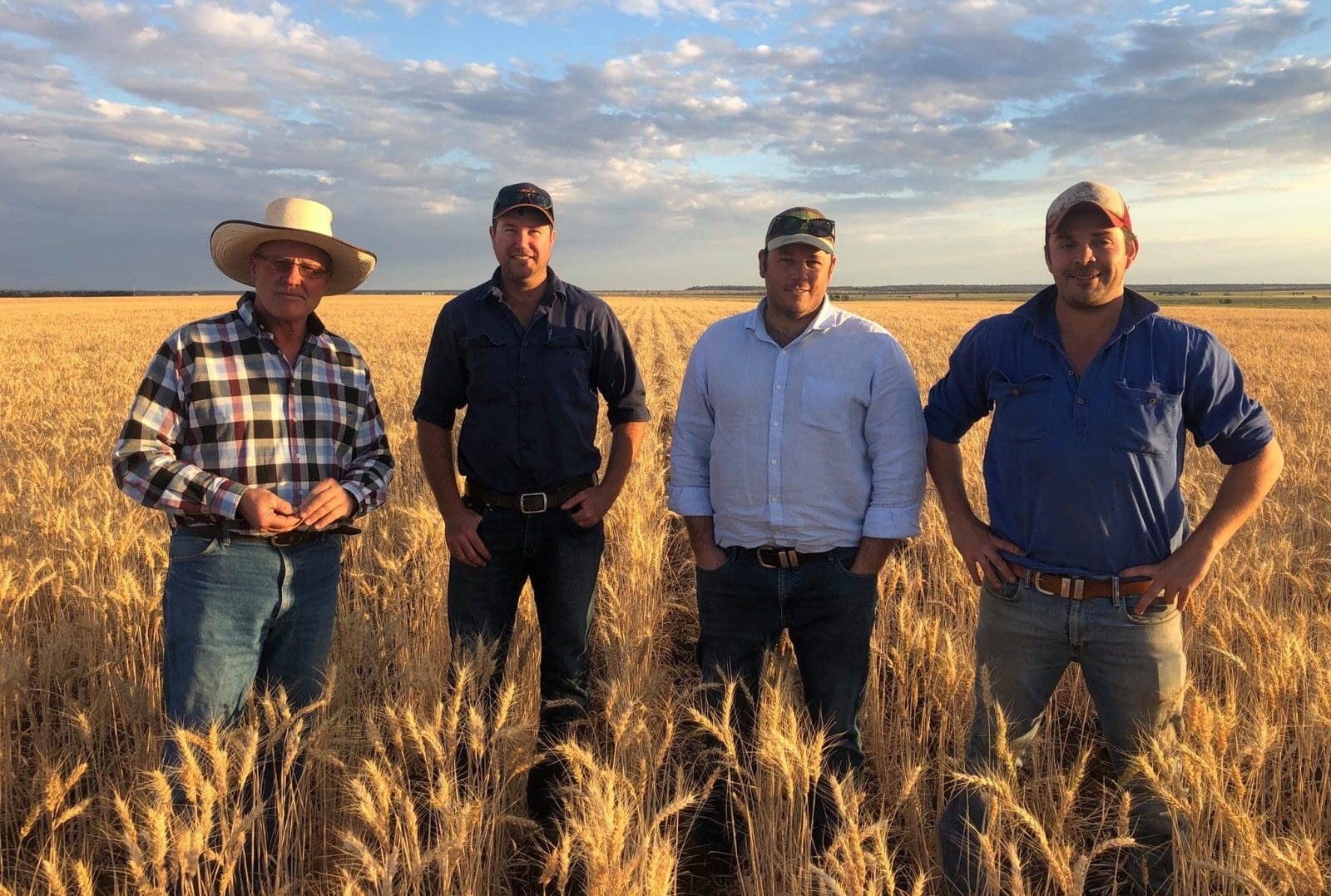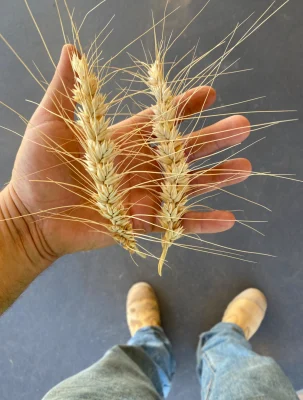
Rebel Seeds directors Damien Scanlan, Andrew Butler, Derryck Mickelborough and Stephen Gibson in a paddock of Borlaug 100. Photo: Rebel Seeds
AUSTRALIA’S smallest seed company has received a big boost with the awarding of an Australian Hard classification for Borlaug 100.
The wheat variety arrived in Australia in 2015 via the CIMMYT-Australia-ICARDA Germplasm Evaluation (CAIGE) project after it caught the eye of the Australian wheat-breeding delegation visiting Mexico’s International Maize and Wheat Improvement Center, commonly known as CIMMYT.
It has been grown commercially in Australia under licence from Rebel Seeds since 2019, and has grown in Mexico as a milling wheat for many years.
The Australian Hard classification means Borlaug 100 will now be eligible for delivery into H2 segregations at bulk-handling sites throughout its growing area in Queensland and northern New South Wales.
Late last month, Rebel Seeds made the announcement on social media: “Borlaug has been officially approved for the 2024 receivals at GrainCorp and other wheat-receiving depots throughout all Queensland and northern New South Wales sites.
“It will have an Australian Hard classification that means it qualifies for H2 (11.5-13 percent protein) or any grade lower.”
Rebel Seeds director Damien Scanlan told Grain Central the news has been welcomed by growers, as well as fellow directors Andrew Butler, Stephen Gibson and Derryck Mickelborough.
“Ahead of this year’s harvest, growers of Borlaug can now contract Hard wheat instead of having to take the lower multigrade price,” Mr Scanlan said.
While some flour millers have been buying Borlaug 100 for domestic use, the Hard classification means it can now find its way to export in parcels incorporating H2 protein specs.
Pleasing yields
Borlaug 100’s Hard classification is a pleasing result for a variety brought to Australia to fill a void the Rebel Seeds directors saw in the landscape for a wheat well suited to lower-rainfall vertosol country surrounding the Downs feedlot industry.
The variety was the first to be commercialised by Rebel Seeds, and stood out for its perceived ability to perform solidly in tough seasons, and pack on yield in good ones.

Heads from a Borlaug 100 crop grown on the Western Downs of Qld. Photo: Rebel Seeds
It has been in the National Variety Trials since 2019, and results from the 2023 season are the latest to illustrate its yielding ability.
Borlaug 100 topped the field at three NVT sites in Qld: Nindigully, with an index figure of 109 and based on a mean yield of 2.5t/ha; Mungindi at 112 based on 2.79t/ha, and Duaringa/Emerald at 114 based on 4.34t/ha.
“Borlaug yields are outstanding under full irrigation, and from a dryland point of view, it’s in the top 5pc,” Mr Scanlan said.
Rebel Seeds currently has a further two commercially available varieties, Rebel Rat and Rebel 65, in the NVT.
Like Borlaug 100, they are both CIMMYT lines, as are five other lines under assessment.
“At this stage, Rebel Seeds is looking for direct introductions that have an application in Australia; we don’t have breeding capabilities of our own.”
“Yield is king, and we’re going down the track of looking for low-input and maximum-production wheat varieties.”
Long road to Hard accreditation
Borlaug 100’s Hard accreditation has been possible after the NVT trials threw up the required three years of data at two locations in GRDC’s Northern region.
The Hard accreditation process does not require the years to be consecutive, but does require protein from the samples harvested at the sites to land in the target range of 11.5-13pc.
“In some of these wetter years, proteins were too low to make that, and trial results were compromised.
“In other years, it can be too dry for the trial to go ahead.”
While Australia’s larger seed companies can assess wheat quality with their in-house systems, Mr Scanlan said smaller ones like Rebel Seeds have to find accredited facilities to test their grain and flour made from it.
“There’s a handful of accredited laboratories you can use for your qualitative data, and that’s something I think is of concern.
“We can put our samples in early, but our job has to fit in with other work coming into those facilities, and that means we can’t control timing.
“As the process goes through, we submit milling data, and Grains Australia has a classification committee that looks at that.”
After five years in the NVT, Rebel Seeds was notified in September of Borlaug 100’s success in gaining Hard classification.
“We didn’t do qualitative testing from day one; we were new to the business.
“Every year we’ve learnt something more, and that puts us in a better position coming through.”
Why not a live list?
Mr Scanlan said Rebel Seeds is spreading the word about Borlaug 100 now being a Hard wheat, and would love to see Grains Australia’s Wheat Variety Master List become a live document.
“It just seems a simple thing to do that would give growers the maximum amount of knowledge for planting decisions.”
The master list is administered by the GRDC-funded industry-good Grains Australia body, which took over the duty in 2021 when it absorbed Wheat Quality Australia.
It is released annually on August 1, a date in place for many years that sources say was arrived at to fit in with the release of grain and milling data coming out of breeding programs from state agriculture departments.
Once advised by Grains Australia, seed companies are free to announce their varieties newly gained classification status, and advisors, resellers and the media all contribute to helping spread the word.
Mr Scanlan’s argument point is that not all growers catch the latest in time to order seed, or plant in the ideal window.
“Our view is that growers are making decisions on planting, and they need to have a full understanding of what’s available.”
“The master list is not just for end users, it’s for growers too.
“If growers had a live document to refer to throughout the year, that would fit in with one of Grains Australia’s aims, which is to enhance the profitability of Australian grain.”
A statement from Grains Australia general manager classification Megan Sheehy means that looks unlikely.
“The Wheat Variety Master List is a broad industry document that aligns with trading activities,” Dr Sheehy said.
“Classification runs on an annual process that feeds updating of the master list.”
Grain Central: Get our free news straight to your inbox – Click here

Great to see Borlaug gaining the classification it deserves its a pity that it took so long. I wish Rebel Seeds the best as this industry needs a bit of true competition and a lean operation like them needs congratulations